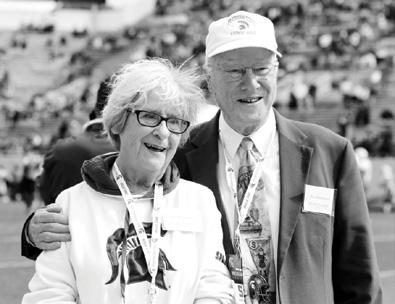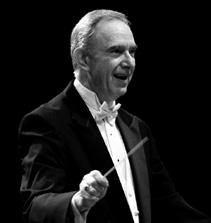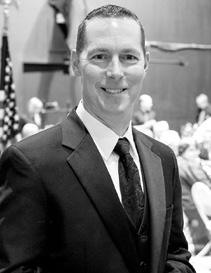
18 minute read
Remembering Kenneth Bloomquist — Kevin Niese
On Friday August 6th , 2021, the music world lost former NBA President, Kenneth G. Bloomquist (19801982). Professor Bloomquist’s musical career began in Iowa as a young trumpet player. He attended the University of Illinois in 1953 with a Bachelor of Music Education degree and later a Master of Music Education degree in 1957. In 1958, Professor Bloomquist joined the faculty at the University of Kansas as assistant director of bands and professor of trumpet. During his tenure at KU, he was appointed director of bands in 1968. In 1970, Professor Bloomquist became the director of bands at Michigan State University, where he directed the Spartan Marching Band, Wind Ensemble, and Symphony Band. At Michigan State, Bloomquist was promoted to the director of the School of Music in 1983 and continued as the director of bands until his retirement in 1993. These accomplishments alone are very notable and impressive, however, the work of Professor Bloomquist is much more significant. Known as a world renowned conductor and pedagog, Professor Bloomquist was equally known for his sincerity and genuine care for music and its counterparts.
My hope for this article is
to show the unfeigned delight of Kenneth G. Bloomquist. When asked to compile these personable accounts from his loved ones, I was welcomed with an overflow of authentic reflections. From teachable moments to fun memories, it was clear that Professor Bloomquist left a true impact on all those who encountered him. On the mere surface, many outside his circle would simply see Mr. Bloomquist as an accomplished ensemble director, but the legacy of this incredible man goes far beyond the barriers of music. In order to highlight the life of Bloomquist, I was fortunate to interact with some of his former students and closest friends. These individuals have contributed precious time and energy into bringing this project to life. Special thanks is extended to Jim Barry, Mike Kaufman, and Beth Kaufman for sharing their experiences with Professor Bloomquist.
INTERVIEW
Kevin Niese: Many knew him as Professor Bloomquist. Did he have any personable nicknames?
Mike & Beth Kaufman: His wife, Ann, usually called him “Kenny,” Mr. Bloomquist was often addressed by students as Mr. B, and as is so often the case for our most respected mentors, none of us ever quite got used to calling him Ken. And lastly, Mr. B's middle name was Gene, and so it was always an endearment to affectionately refer to our beloved band director as - KGB! Bloomquist? What were his mannerisms on the podium?
Remembering Kenneth Bloomquist, Kevin Niese, cont.
Jim Barry: Rehearsals were always well-organized and unhurried. Ken tossed in humor or an anecdote when appropriate. He motivated with his personality – you wanted to please Ken; you never wanted to disappoint him - it was rare when he exposed an individual for poor preparation, but when he did . . . oh boy, everybody knew it was deserved; the player was not a “sacrificial lamb.” Ken made a lesson out of it, and as a member of that band, you weren’t going to forget it.
Mike Kaufman: I think all band directors are impacted by one's collegiate experiences, and it's those ensemble rehearsals that are often the most influential in shaping one's career. Of the many lessons learned, one of the most important was his ability to inspire. Mr. Bloomquist definitely had this gift. He could equally praise a fine effort, and at the same time be brutally honest and dead on accurate. Mr. Bloomquist had an innate ability to positively reach everyone in his rehearsals. From doctoral performance majors to incoming freshmen, he was all business during rehearsal and a master at time on task. This quality may have been one of his best strengths. Bloomquist's own personal musicianship was infectious, and an attention to detail was ever present during rehearsals. For those of us who aspired to teach middle school or high school aged students, there were countless "nuts and bolts" lessons we took away and were able to implement within our own teaching beyond graduation from Michigan State University. To this day, I continue to be grateful for Mr. Bloomquist's emphasis on a "group goals" approach to rehearsal as well as his focused, serious, and at the same time, collegial rehearsal style.

Kevin Niese is a first-year Graduate Associate pursuing a Master of Music Education degree at Ohio University, with an emphasis in conducting. Prior to his current graduate appointment, he taught for five years in public education. His positions included Director of Bands for Vinton County Local Schools in McArthur, OH and Assistant Director of Bands for Nordonia Hills City Schools in Macedonia, OH working with grades 6-12. His teaching responsibilities included Marching Band, Concert Band, Chamber Ensembles, Pit Orchestra, Pep Band, Jazz Band, and various music electives. Kevin’s students were also successful participants in OMEA (Ohio Music Education Association), and BOA (Bands of America) adjudicated events receiving exceptional ratings. Kevin returns to Ohio University as a Cum Laude graduate with a Bachelor’s in Music Education. The North Central Ohio native currently assists with all wind bands at Ohio University including the Marching 110, Wind Symphony, Symphonic Bands, and University Concert Band.
Remembering Kenneth Bloomquist, Kevin Niese, cont.
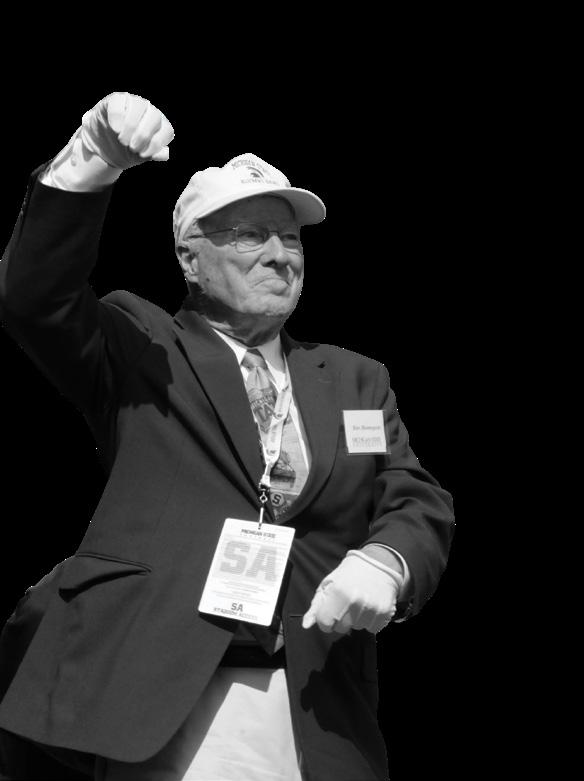
Kevin Niese: It’s clear that Prof. Bloomquist enjoyed and performed music at a high level for the entirety of his career. Are there any particular performances or accomplishments that stand out that would help us comprehend his superior achievements?
Mike Kaufman: Mr. Bloomquist's professional accomplishments are so varied and significant. His University of Kansas Brass Choir toured the Far East and Australia, performing for sold out audiences including many heads of state and dignitaries. He created the MSU Alumni Band in 1971, a group that began with an alumni Marching Band. He later added an alumni Concert Band which performed both on campus and abroad. Our MSU band experience included cornerstone repertoire as well as his creation of a New Music Symposium, which at the time was a rather revolutionary concept. Mr. Bloomquist also managed to attract many of the absolute giants from our profession to visit MSU and clinic the bands.
William Schumann, Vincent
Persichetti, Karel Husa, Frederick Fennell, Arnald Gabriel, Harry Begian, William Revelli, Sir Vivian Dunn. These are just some of the names I remember from nearly 50 years ago. Of course, we had our own Leonard Falcone, Owen Reed and Owen's student David
Maslanka. These leaders in our profession were regularly in our rehearsals or guest conducting at our concerts. The impact was incredible. It was all arranged for and orchestrated by Mr. Bloomquist. Mr. Bloomquist was most influential in transforming the Department of Music at MSU to a School of Music, and with it came more stature and financial resources. He supported Dean Forger's effort to build a new music facility, one that was sorely needed for many years and finally opened in 2020. Upon completion of the new building, Mr. Bloomquist remarked: “MSU is a model of success in the performing arts nationally and internationally. We have quality students, professional and respected music faculty, and a University that is known worldwide. We are able to attract and invite the world’s greatest artists to our campus. Our faculty, our students, and our patrons deserve high-quality spaces in which to practice, perform, and experience high-quality music.”
Kevin Niese: Outside of music, what was Prof. Bloomquist known for?
Jim Barry: Ken loved to travel (often by rail), he enjoyed good food and wine, and he was an avid reader. But Ken was a family man first. He demonstrated profound and enthusiastic love and pride for his three (now grown) children Leslie, Laurie, and Dan, his 9 grandchildren, 5 greatgrandchildren, and of course his loving wife of over 80 years, Ann, who he affectionately called Annie. Beth Kaufman: A little known fact, Mr. B was an excellent ping-pong player. Cowles House, the home of the university President, was right next to the marching band practice field. Apparently, after practice, he would often head over to play ping-pong with President Cecil Mackey. He (Bloomquist) won every single time. Mr. B also played taps every night on the deck of his Northport home overlooking Lake Michigan. It started many years ago, when he got out his trumpet when his grandson was visiting. They would head outside and play taps as the sun would set over the lake. He continued playing right up to a few weeks before he passed away. Remembering Kenneth Bloomquist, Kevin Niese, cont.
Kevin Niese: When reflecting on your time under Prof. Bloomquist, what do you remember most about him?
Beth Kaufman: His smile. When you were talking, he gave you his undivided attention. He did not glance around the room to see if there was anyone around who was more important. I remember his efficiency. When I first auditioned for the Marching Band, I was not yet enrolled at MSU. Once he offered me the position as Feature Twirler, he immediately got on the phone to arrange admission, housing and classes. I certainly remember his storytelling. Mr. B had so, so many experiences in his lifetime that it was easy for him to reminisce and entertain people with the humorous slant he was able to put on each story. I would listen to him in amazement, mostly because of the famous people about which he would talk so casually. To say he was a prankster is an understatement.
Kevin Niese: Students are challenged by adversity throughout their academic careers. As Prof. Bloomquist has been described as a fatherfigure by so many, do you recall memories of him guiding you through these challenging times?
Mike Kaufman: Some of the best lessons for all college students are learned when our mentors are faced with adversity or difficult situations. I think Mr. B taught us countless life lessons that were not necessarily about the music, or about band, but simply about how to be as a professional. So with that in mind, we all were the beneficiaries of Mr. Bloomquist demonstrating grace under pressure. His students all learned through his example:
“The buck stops here.” “If something is not working, look at yourself first.” “Control your emotions.” “Praise in public, discipline in private.” “Never be condescending and never humiliate students in rehearsal.” “Always show respect, show genuine interest and treat everyone equally.”
Kevin Niese: I imagine navigating life through Title IX was an adventure. Beth, do you
Remembering Kenneth Bloomquist, Kevin Niese, cont.
recall specific moments, in or outside rehearsals, where Prof. Bloomquist not only advocated but embraced the integration of men & women in the Spartan Band?
Beth Kaufman: I can only speak about the integration of men and women in the band based upon my own experience. My story reflects the impact Mr. B had on all students, not just those majoring in music. I was not a musician. I was not a music major. I was not a band director. I was a competitive baton twirler and a student at Western Michigan University planning to start my Sophomore year.
In the summer of 1972, I switched schools from WMU to Michigan State primarily due to the passage of Title IX. This legislation opened up several opportunities for women to participate or engage in activities that previously were segregated. That included allmale marching bands. I wanted to continue my twirling days so I called and requested an audition at MSU.
After my audition, I was ushered into the office to meet Ken Bloomquist, Director of Bands. Mr. B’s first words were “Well young lady, you are going to be famous and infamous!” I had no clue what I was getting into! But, Mr. Bloomquist was always there to support and protect me, if needed, from some members who initially weren’t really happy about my presence. He did not sugarcoat the position I now found myself in—there would be some adversity, negativity, skepticism from those who were not ready to accept women in the band. But in the long run, those men became my most fierce advocates and friends, which I credit to Mr. Bloomquist’s influence. He surely took the brunt of a lot of push back for the decision he made, but it was never brought to my attention. The best advice he gave me… “Do not quit. Work hard and prove every day that you earned this spot in the band.”
I always felt like I was a valued member of the band. I followed all the same rules and protocols as all members. I will never know how much “shielding” Mr. Bloomquist may have done behind the scenes but my guess is, quite a lot. The whole idea of women in the band was downplayed, as if this was nothing new. I was never given more or less attention than any other band member. So much of that first season was a whirlwind, with Mr. B continuously in the shadows making sure the transition to women in the band went as seamlessly and as positively as possible.
Kevin Niese: Prof. Bloomquist instilled a culture at Michigan State. What was this culture like and how did his students/ colleagues respond?
Mary Platt-MSU Alumni Band, Director, Hilbert Museum of California Art, Chapman University (answer acquired by Jim Barry): Band leader and conductor, clinician, university administrator - but “Mr. B” was more, much more than that. As only the greatest band directors are, he was also an inspiration, teacher, coach and friend, one who urged us all to find our highest calling and to find dedication and joy in working for a goal that was much bigger than us.
Mike Kaufman: Regarding the MSU band culture, there is one very meaningful extraction from Mr. Bloomquist's memoir:
“Support for me and bands accelerated and was aided after a happening involving my ability to play trumpet. Clyde Roller was the conductor of the Lansing Symphony Orchestra (LSO) and also was a conductor of the Houston Symphony Orchestra. The LSO was a very good community orchestra with wonderful professional and semi-professional players, many of which were MSU Music Department faculty members. Annie and I went to the Lansing Symphony Orchestra’s first concert of the season in October of 1970. The concert was very good and Annie and I went backstage to see and congratulate Clyde. He looked at me and said "What are you doing here?" I told him I was the new Director of Bands at MSU. He said immediately, you've got to play in the LSO. This is not a good trumpet section and I need you. I told him I had retired from playing trumpet to conduct. I had known Clyde Roller a long time and he knew me, but only as a trumpet player. He called me everyday and after about two weeks I finally agreed
to play 3rd trumpet and coach the LSO trumpet section. At the next Lansing Symphony Orchestra rehearsal in November, I asked the two trumpet players at the first rehearsal which one was the 1st player. They answered quickly that "the maestro says you are." I went to Clyde and he literally conned me into playing the first trumpet part. I actually, to my surprise, played the first trumpet part very well. Starting the day after that first LSO rehearsal the wind faculty members kept coming to my MSU office, and I must add, one at a time, to extol my virtues as an "orchestral" trumpet player. They became supportive because I was an "orchestral musician" and began talking their students into auditioning for the bands. With my new elevation as a "real musician" and not just a band director, life got much better in getting the good MSU wind and percussion players to participate in the bands. It still rankles me to think about it but it is a true story.”
Additionally, he never blew his own horn and never displayed any hint of arrogance. He was so much fun and gracious in social settings. We all knew with Mr. B, what you see is what you get. All of this contributed to a wonderful culture that he groomed within the MSU band department.
Kevin Niese: What was Prof. Bloomquist’s legacy to you and what would you want those who never met him to know?
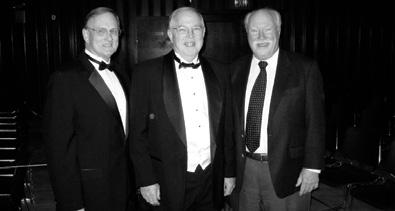
Jim Barry: As loyal as Ken’s students were to him, Ken Remembering Kenneth Bloomquist, Kevin Niese, cont.
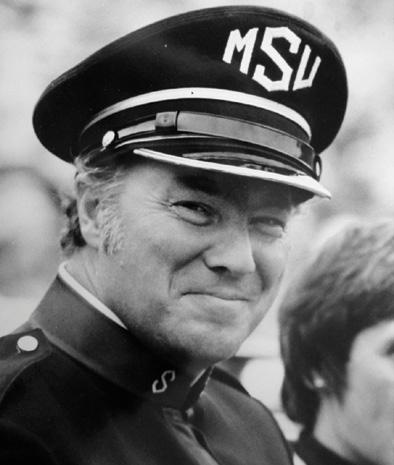
Remembering Kenneth Bloomquist, Kevin Niese, cont.
reciprocated in spades. (no surprise there, right?) It was just a part of his nature. Two years after I’d played my last notes as a trumpeter in his MSU Symphony Band, and had graduated from MSU, I was back in the concert hall with “Mr. Bloomquist.” This time, Ken was in the auditorium as a parent at my first Okemos High School (Michigan) Band concert in 1975. 31 years later he was playing trumpet with my students on “Bugler’s Holiday” alongside his son, Dan, and grandson, Ian. As an encore, Ken handed me his trumpet, took my baton, and we played it again with Ken on the podium! Ken never forgot his students!
Kevin Sedatole-Director of Bands, Michigan State University (answer acquired by Jim Barry): For me, he was an amazing supporter that only wanted the very best for MSU bands. Ken was always interested in what we were doing and what was the next thing - always wanted to stay on the cutting edge. His legacy at MSU will always remain through all of his terrific students. The scholarships in his name will continue to further that legacy. RIP dear mentor, colleague, friend and great Spartan! You will forever be remembered.
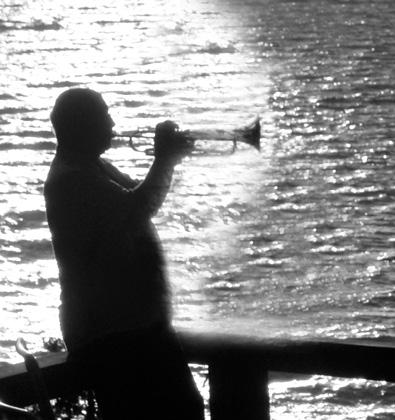
Mike & Beth Kaufman: Maya Angelou said, “I’ve learned that people will forget what you said, people will forget what you did, but people will never forget how you made them feel.” Ken Bloomquist made all of us feel important. He made us feel valued. He made us feel proud. He showed us by example how to be humble, honest and fair. Mrs. Bloomquist said, “Ken was willing to take a chance on you and willing to give you more than one chance.” And for that, we are forever grateful.
Ken Bloomquist will always be remembered as a master teacher, but his memory will live on for his innate ability to connect with people. From students to colleagues, family members, and friends, his impactful influence touched so many. Ken’s stories and teachings will be passed on for generations to come. He commented during his last days,
“I wish I could live another lifetime because I want to know what’s coming ahead in the world of technology, travel to other galaxies, cures for life threatening illnesses, world relationships, etc.. I guess I’ll have to look down from above, or maybe up from below, to find the answers to these questions.”
A lifelong learner until the very end. Thank you, Mr. Bloomquist, for all that you gave to music and its loved ones. Rest in peace, and continue being stellar!
Remembering Kenneth Bloomquist, Kevin Niese, cont.
BIOGRAPHIES JIM BARRY retired in June, 2006 after 33 years teaching instrumental music in Michigan. He served as Director of Bands at Okemos High School for 31 years, 1975-2006, after two years teaching in the Holly Area Schools. Jim was a member of Seraphime Mike’s high school bands in Roseville, Michigan. He earned both his bachelor’s (1973) and master’s (1983) degrees in instrumental music education from Michigan State University, and now serves as a board member of the MSU Alumni Band. Jim was a member of Ken Bloomquist’s MSU bands. Two of Ken and Ann’s children were in Jim’s first Okemos bands. 31 years later, one of their grandchildren was in his last. Jim and Linda moved a little south to Northville, Michigan in 2011, after residing in Okemos for 37 years. They have two children, son Mark (wife Aly) in Pasadena, California, and daughter Kim in heaven.
MICHAEL KAUFMAN became Director of Bands at Grand Ledge High School, Grand Ledge, Michigan in 1981, leading the program for 27 years until his retirement in 2008. Major appearances with the Grand Ledge Wind Symphony include the 1983 and 2000 MidWest Clinic performances, two CBDNA conventions, one NBA convention and four Michigan Music Conferences. Mr. Kaufman also served for 24 years as the director of the summer Wind Studies program and All State program at the Interlochen Center for the Arts. He received the Bachelor of Music and Masters of Music degrees with honors from Michigan State University and has been the recipient of the NBA Citation of Excellence; the ASBDA Stanbury Award, the Sudler Flag of Honor, the MSBOA Teacher of the Year, the Michigan State University College of Education Crystal Apple award, and in 1997 was elected membership in the American Bandmasters Association. Currently making regular appearances with various wind ensembles, Mr. Kaufman serves today as a guest conductor and clinician throughout the eastern United States.
BETH MLYNAREK KAUFMAN was among the first two women in 1972 to be admitted to the previously all male Michigan State University Spartan Marching Band. She graduated with honors from Michigan State University receiving Bachelor and Master degrees in Special Needs Education, Learning Differences and Reading Instruction. Her thirty-five year career included classroom teaching, consulting and providing instructional support for teachers in the Mason School District in Mason, Michigan. Mrs. Kaufman also served as Director of the Title I, Gifted and Talented, and Mentor/ Beginning Teacher programs for Mason Public Schools and the Ingham Intermediate School District. Today, Mike and Beth are retired and live in Traverse City, Michigan.
